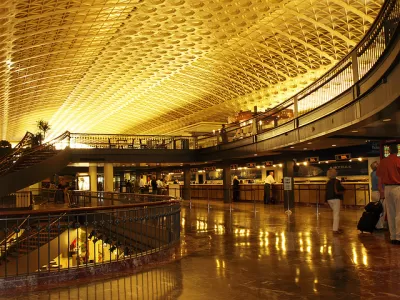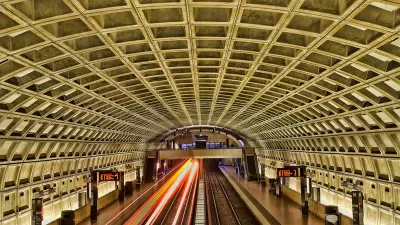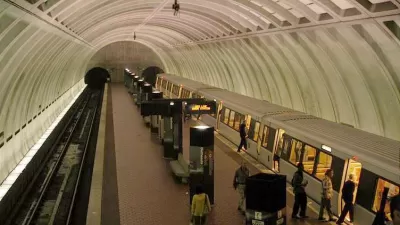Flat fares, reduced wait times, and extended late-night service are all part of a package of changes meant to bring riders back and adjust to post-pandemic travel patterns.

Washington, D.C.'s transit system is getting a major overhaul that officials hope will entice new and old users and boost ridership, reports Jake Blumgart. Because the pandemic upended the traditional workday commute, "policymakers decided to make aggressive changes to pivot away from a schedule that prioritizes traditional rush hour riders. Metro has the third largest heavy rail system in the U.S. and runs the country’s sixth largest bus system, so its policy shifts are likely to be noted by its counterparts and could be pace-setting for the larger public transport sector."
Among the sweeping changes, "[w]eekend trips will universally be priced at $2 a ride, as opposed to the usual model based on distance traveled. Transfer fees that heavily penalize lower-income riders (who don’t tend to live next to rail stops) will be eliminated. The price of bus passes will fall, while frequencies on 36 bus lines will be increased." The changes also include reduced wait times on the system's most heavily used line and extended late night service.
"In determining how to make changes, Metro policymakers studied where ridership remained strongest even during the pandemic’s worst. They saw that low-income riders and those without access to a car continued to use public transit heavily, as did many essential workers in the health-care and government fields. As vaccinations spread, and restaurants began to recover, they also saw increased demand at night from food service workers," a segment traditionally underserved by transit options.
The funding gap created by last year's plummeting ridership "is being filled by the generous operating subsidies provided by the federal government in the various rescue packages passed by Congress in 2020 and early 2021," but "Metro is planning for the end of those federal operating subsidies."
As the first major city to implement such drastic changes after the COVID-19 pandemic, D.C. could serve as "a model for other parts of the country."
FULL STORY: Big Changes Coming to D.C.’s Transit to Boost Ridership

Maui's Vacation Rental Debate Turns Ugly
Verbal attacks, misinformation campaigns and fistfights plague a high-stakes debate to convert thousands of vacation rentals into long-term housing.

Planetizen Federal Action Tracker
A weekly monitor of how Trump’s orders and actions are impacting planners and planning in America.

San Francisco Suspends Traffic Calming Amidst Record Deaths
Citing “a challenging fiscal landscape,” the city will cease the program on the heels of 42 traffic deaths, including 24 pedestrians.

Adaptive Reuse Will Create Housing in a Suburban Texas Strip Mall
A developer is reimagining a strip mall property as a mixed-use complex with housing and retail.

Study: Anti-Homelessness Laws Don’t Work
Research shows that punitive measures that criminalized unhoused people don’t help reduce homelessness.

In U.S., Urban Gondolas Face Uphill Battle
Cities in Latin America and Europe have embraced aerial transitways — AKA gondolas — as sustainable, convenient urban transport, especially in tricky geographies. American cities have yet to catch up.
Urban Design for Planners 1: Software Tools
This six-course series explores essential urban design concepts using open source software and equips planners with the tools they need to participate fully in the urban design process.
Planning for Universal Design
Learn the tools for implementing Universal Design in planning regulations.
Heyer Gruel & Associates PA
JM Goldson LLC
Custer County Colorado
City of Camden Redevelopment Agency
City of Astoria
Transportation Research & Education Center (TREC) at Portland State University
Jefferson Parish Government
Camden Redevelopment Agency
City of Claremont





























